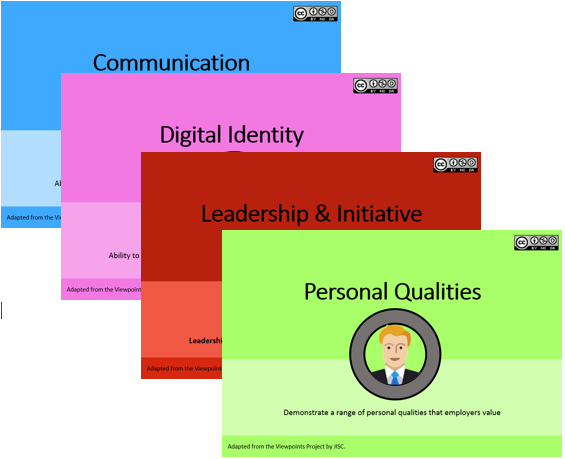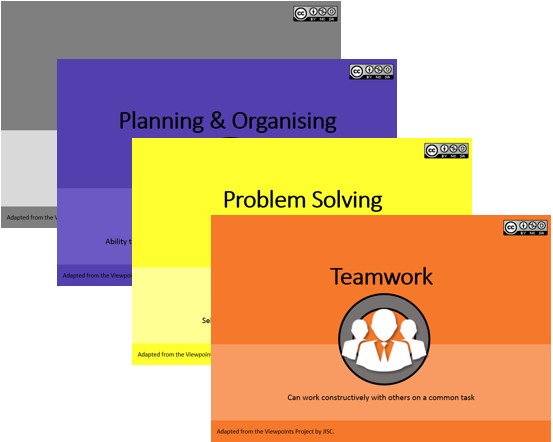
D4 Employability Curriculum Design Workshop
The D4 Employability Curriculum Design Workshop is a 4 stage process for curriculum design. It was designed as a way to introduce employability into the curriculum in a well-planned and supported way.
The D4 Employability Curriculum Design Approach draws on principles of Appreciative Inquiry. Appreciative Inquiry is a positively focussed model for change management, designed around four stage: discover, dream, design, destiny (Kadi-Hanifi et al. 2014). We have developed a set cards which unpick aspects of employability which are used to support the workshop. There are modelled on the Viewpoints approach (Nicol 2012).
Workshop uses resources here are provided under creative commons licence Attribution-NonCommercial-ShareAlike, (This license lets others remix, tweak, and build upon your work non-commercially, as long as they credit you and license their new creations under the identical terms).

Resources
- The D4E Workshop Plan
- The D4E Workshop PowerPoint
- Printable copies of the Employability cards
- The D4E Mapping Template (A1 Size for printing)
- The D4E Action Planning Template
- The D4E Workshop Evaluation Form
- D4E Key Information Handout

Further Information:
Useful Resources on Employability:
These are some of the resources on which the workshop has been based.
Links:
- HEA document by Yorke & Knight (2006): Embedding Employability into the Curriculum
- HEA document by Roberts (2008): Recording and Reflecting on workplace experience
- HEA Website: Defining and Developing your Approach to Employability: A Framework Higher Education Institutions
- Jisc report by Chatterton & Rebbeck (2015): Technology for Employability
- Jisc case studies by Chatterton & Rebbeck (2015): Technology for Employability: HE Case Studies
- Jisc’s presentation from the webinar: Preparing for Employability in a Digital Age
References:

Artess, J., Forbes, P. and Ripmeester, N. (2011) Supporting Graduate Employability HEI Practice in Other Countries, BIS Research Paper Number 40, Department for Business Innovation and Skills.

Kadi-Hanifi, K., Dagman, O., Peters, J., Snell, E., Tutton, C., & Wright, T. (2014). Engaging students and staff with educational development through appreciative inquiry. Innovations in Education and Teaching International, 51(6), 584-594. doi:10.1080/14703297.2013.796719

Lowden, K., Hall, S., Elliot, D., and Lewin, J. (2011) Employers’ perceptions of the employability skills of new graduates, Research commissioned by the Edge Foundation, University of Glasgow, The SCRE Centre.

Lowden, K., Hall, S., Elliot, D., and Lewin, J. (2011) Employers’ perceptions of the employability skills of new graduates, Research commissioned by the Edge Foundation, University of Glasgow, The SCRE Centre.

Nicol, D. (2012). Transformational Change in Teaching and Learning Recasting the Educational Discourse EVALUATION OF THE VIEWPOINTS PROJECT at the University of Ulster.

Pegg, A., Waldock, J., Hendy-Isaac, S. and Lawton, R. (2012) Pedagogy for employability, in Learning and Employability: Series One, Higher Education Academy.